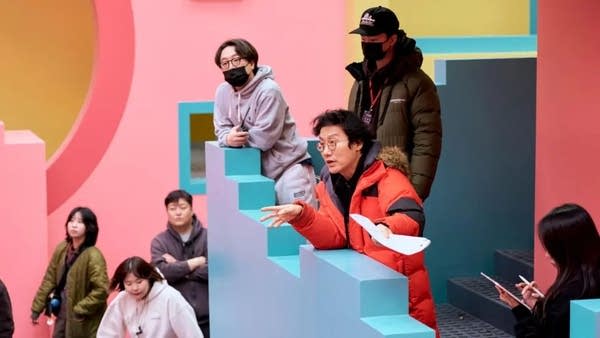Korean creatives want a bigger slice of the streaming pie
Netflix has stormed the Korean market with billions of dollars of investment, bringing the industry global recognition, but leaving creators feeling short-changed.

This story was produced by our colleagues at the BBC.
When I asked the creator of the hit Korean drama “Squid Game” about reports that he was so stressed while shooting the first series he lost six teeth, he quickly corrected me. “It was eight or nine,” he laughed.
Hwang Dong-hyuk was speaking to me on set as he filmed the second season of his dystopian Netflix thriller, which sees hundreds of debt-laden contestants fight it out for a whopping cash prize, by playing a string of life-or-death children’s games.
But another season was not always on the cards. At one point, he swore against making one. Given the stress it has caused him, I asked what changed his mind.
“Money,” he said, without hesitation.
“Even though the first series was such a huge global success, honestly I didn’t make much. So doing the second series will help compensate me for the success of the first one too.”
The first season was Netflix’s most successful show to date, thrusting South Korea and its home-grown television dramas into the spotlight. Its dark commentary on wealth inequality touched a nerve with audiences around the globe.
Three years after the first season aired, Hwang is even more pessimistic about the state of the world.
He points to current wars, climate change and a widening global wealth gap. Conflicts are no longer confined between the rich and poor, they are playing out intensely between different generations, genders and political camps, he said.
“New lines are being drawn. We’re in an era of us vs. them. Who’s right and who’s wrong?”
Hwang tried for 10 years to get “Squid Game” made, taking out large loans to support his family, before Netflix swooped in.
They paid him a modest upfront amount, leaving him unable to cash in on the whopping £650m it is estimated to have made the platform.
This explains the love-hate relationship South Korea’s film and television creators currently have with international streaming platforms.
Over the past few years, Netflix has stormed the Korean market with billions of dollars of investment, bringing the industry global recognition and love, but leaving creators feeling short-changed.
They accuse the platform of forcing them to relinquish their copyright when they sign contracts — and with it, their claim to profit. This is a worldwide problem.
In the past, creators could rely on getting a cut of box office sales or TV re-runs, but this model has not been adopted by streaming giants. The issue is compounded in South Korea, creators say, due to its outdated copyright law, which does not protect them.

This summer, actors, writers, directors and producers teamed up to form a collective, to fight the system together.
“In Korea, being a movie director is just a job title, it’s not a way to earn a living,” the vice president of the Korean Film Directors Guild, Oh Ki-hwan, told the audience at an event in Seoul.
Some of his director friends, he says, work part-time in warehouses and as taxi drivers. Creators are pushing the South Korean government to change its copyright law to force production companies to share their profits.
In a statement, the South Korean government told the BBC that while it recognized the compensation system needed to change, it was up to the industry to resolve the issue. A spokesperson for Netflix said it offers “competitive” compensation, and guarantees creators “solid compensation, regardless of the success or failure of their shows.”
“Squid Game’s” Hwang hopes his candor over his own pay struggles will initiate that change. He has certainly sparked the fair pay conversation, and this second season will surely give the industry another bump.
But when we catch up after filming has wrapped, he tells me his teeth are aching again.
“I haven’t seen my dentist yet, but I’ll probably have to pull out a few more very soon.”










